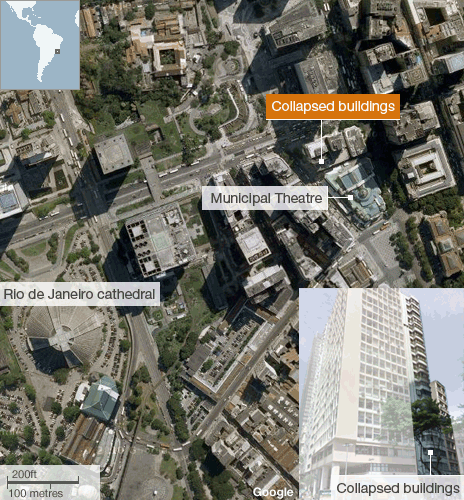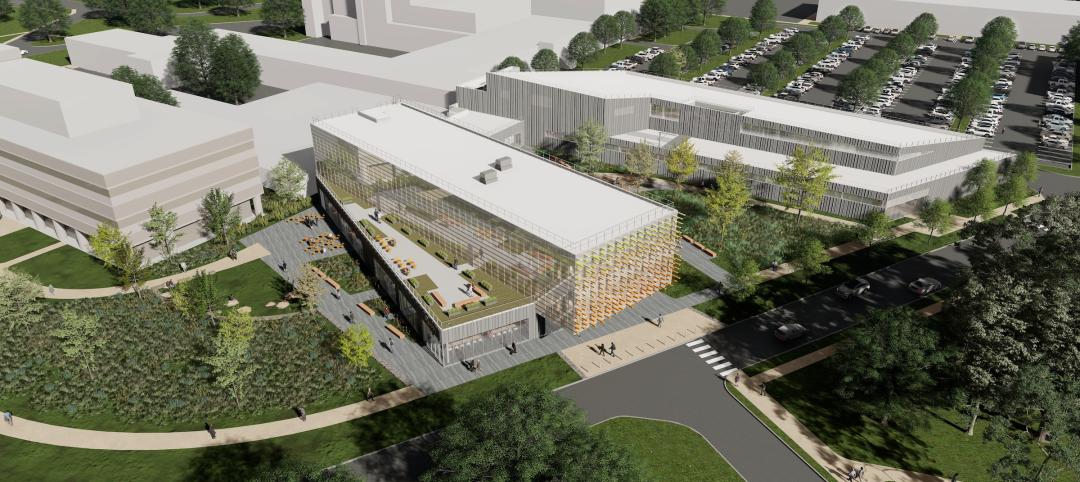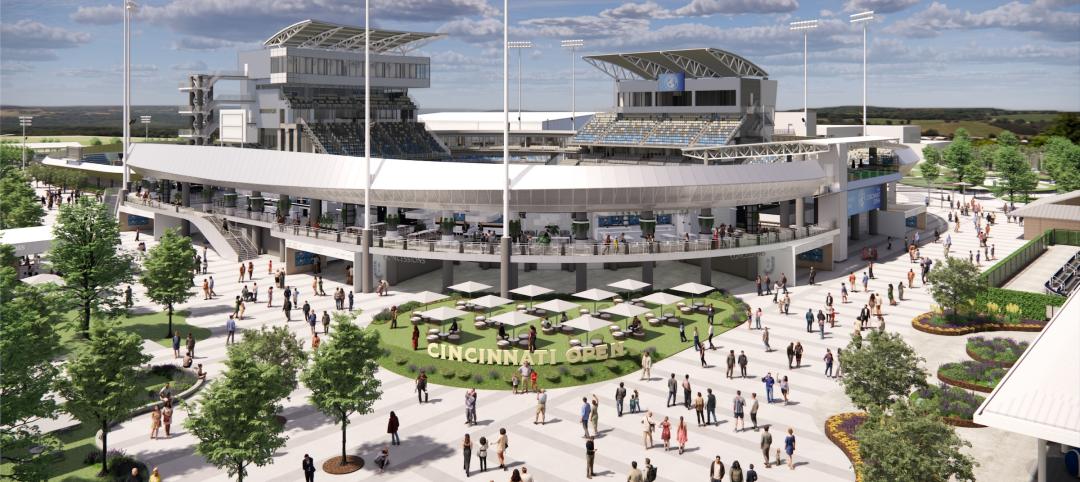RIO DE JANEIRO, Jan 26 (Reuters) - Rescuers on Thursday recovered three bodies from the rubble of three buildings that collapsed in downtown Rio, highlighting the creaky infrastructure of the city that will host the 2014 soccer World Cup and the 2016 Olympics.
The buildings, one 20 floors high, collapsed on Wednesday night in a cloud of dust and smoke just one block away from the city's historic Municipal Theater.
Rescue teams pulled six people alive from the rubble, but at least 16 people were still missing, authorities said. The buildings were mostly used for office space during the day and were almost empty at the time of the disaster.
Rio de Janeiro Mayor Eduardo Paes said the cause of the collapse could have been a structural failure caused by work being done on one of the buildings. He said there was no gas leak that could have caused an explosion.
"The work on one of the buildings could have been the cause. They could have bungled it. That's one hypothesis but it is speculation," Paes told CBN radio broadcaster. "We will investigate this fully, because it is not normal for a building to collapse," he said.
Rio is struggling to address concerns about its decrepit infrastructure, unreliable power supplies and deficient public transportation as it prepares to host global sporting events.
Construction and renovation of 12 stadiums for the soccer World Cup in 2014 is behind schedule and there is concern that Brazil's overcrowded and inefficient airports will be not able to handle masses of sports fans expected to attend the events.
The building collapses come months after an explosion apparently caused by a gas leak ripped through a restaurant in downtown Rio, killing three people and igniting more concern about the state of the city's infrastructure.
In recent months, Rio's inhabitants have had to deal with exploding sewer lines and landslides in the city's slums caused by heavy rain and deforestation.
The collapsed buildings had a bakery and an Itau Unibanco Holding bank branch on the ground floor and were near the headquarters of state-run companies such as oil giant Petrobras and development bank BNDES.
Witnesses said they heard the structures cracking and saw plaster falling before the buildings collapsed, causing panic in the streets and covering parked cars with dust and debris.
"It was like an earthquake. First some pieces of the buildings started to fall down. People started to run. And then it all fell down at once," a witness who identified himself as Gilbert told Reuters.
One man said he was on the 10th floor and ran down the stairs just in time to escape the collapse. BD+C
Related Stories
Women in Design+Construction | May 28, 2024
Commerce Department launches Million Women in Construction Community Pledge
The U.S. Department of Commerce launched its Million Women in Construction Community Pledge this month to boost the ranks of women in construction companies. Federal investments are creating a construction boom that is increasing job opportunities for construction and trade workers.
Laboratories | May 24, 2024
The Department of Energy breaks ground on the Princeton Plasma Innovation Center
In Princeton, N.J., the U.S. Department of Energy’s Princeton Plasma Physics Laboratory (PPPL) has broken ground on the Princeton Plasma Innovation Center (PPIC), a state-of-the-art office and laboratory building. Designed and constructed by SmithGroup, the $109.7 million facility will provide space for research supporting PPPL’s expanded mission into microelectronics, quantum sensors and devices, and sustainability sciences.
MFPRO+ News | May 24, 2024
Austin, Texas, outlaws windowless bedrooms
Austin, Texas will no longer allow developers to build windowless bedrooms. For at least two decades, the city had permitted developers to build thousands of windowless bedrooms.
Resiliency | May 24, 2024
As temperatures underground rise, so do risks to commercial buildings
Heat created by underground structures is increasing the risk of damage to buildings, recent studies have found. Basements, train tunnels, sewers, and other underground systems are making the ground around them warmer, which causes soil, sand, clay and silt to shift, settle, contract, and expand.
Sports and Recreational Facilities | May 23, 2024
The Cincinnati Open will undergo a campus-wide renovation ahead of the expanded 2025 tournament
One of the longest-running tennis tournaments in the country, the Cincinnati Open will add a 2,000-seat stadium, new courts and player center, and more greenspace to create a park-like atmosphere.
Mass Timber | May 22, 2024
3 mass timber architecture innovations
As mass timber construction evolves from the first decade of projects, we're finding an increasing variety of mass timber solutions. Here are three primary examples.
MFPRO+ News | May 21, 2024
Massachusetts governor launches advocacy group to push for more housing
Massachusetts’ Gov. Maura Healey and Lt. Gov. Kim Driscoll have taken the unusual step of setting up a nonprofit to advocate for pro-housing efforts at the local level. One Commonwealth Inc., will work to provide political and financial support for local housing initiatives, a key pillar of the governor’s agenda.
Building Tech | May 21, 2024
In a world first, load-bearing concrete walls built with a 3D printer
A Germany-based construction engineering company says it has constructed the world’s first load-bearing concrete walls built with a 3D printer. Züblin built a new warehouse from a single 3D print for Strabag Baumaschinentechnik International in Stuttgart, Germany using a Putzmeister 3D printer.
MFPRO+ News | May 21, 2024
Baker Barrios Architects announces new leadership roles for multifamily, healthcare design
Baker Barrios Architects announced two new additions to its leadership: Chris Powers, RA, AIA, NCARB, EDAC, as Associate Principal and Director (Healthcare); and Mark Kluemper, AIA, NCARB, as Associate Principal and Technical Director (Multifamily).
MFPRO+ News | May 20, 2024
Florida condo market roiled by structural safety standards law
A Florida law enacted after the Surfside condo tower collapse is causing turmoil in the condominium market. The law, which requires buildings to meet certain structural safety standards, is forcing condo associations to assess hefty fees to make repairs on older properties. In some cases, the cost per unit runs into six figures.

















